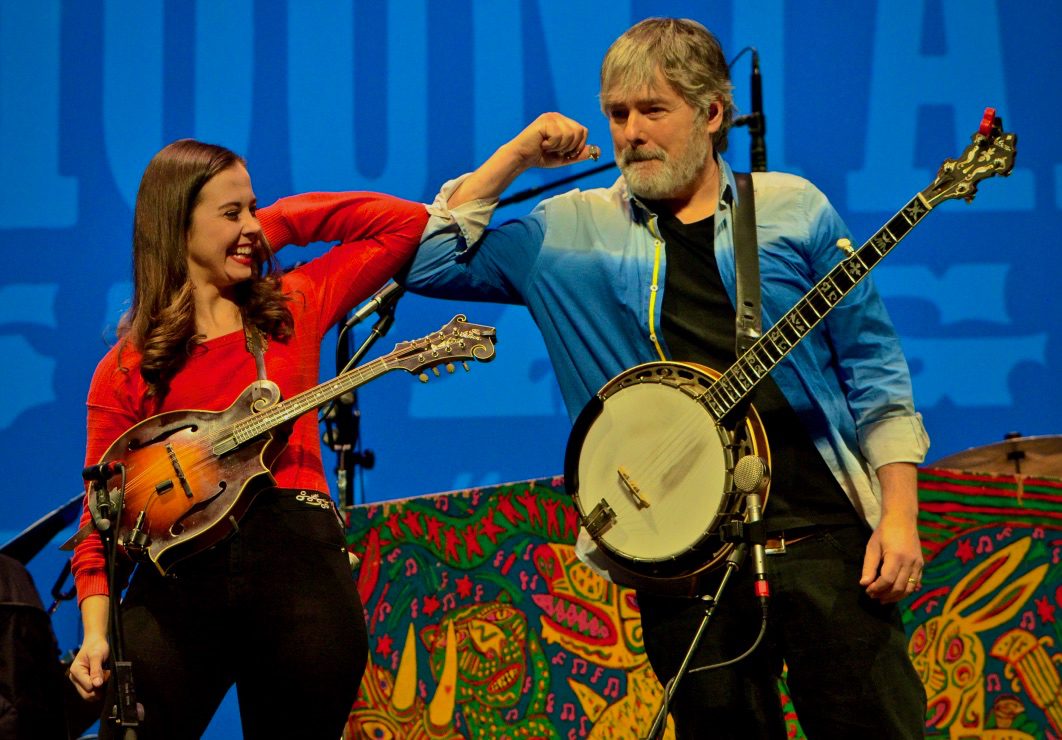FOUNDERS’ KEEPERS: When Boredom Blooms Into Creativity

Béla Fleck resurrects the COVID-era elbow bump with Sierra Hull at Mountain Stage in 2022. (Photo by Amos Perrine)
A measured portion of boredom remains an essential part of any artist’s regular diet. Getting that portion right is tricky. Too much smacks of indolence and indulgence; too little suggests an unseemly devotion to career over craft.
Our late sequestration during two years of COVID provided an overabundance of unstructured time, but we are still reaping the benefits.
In no other circumstance, for example, might it have been reasonable for Béla Fleck to transcribe George Gershwin’s “Rhapsody in Blue” from piano to banjo, 10 fingers and 88 keys down to 5 strings and 24 frets … at the rate of one single, excruciating, exacting measure a day. But, then, Fleck grew up in New York City, near where Gershwin wrote the piece, which debuted 100 years ago. So why not?
Having done all that thinking and tinkering, Fleck presents his transcriptions in three quite different settings for the new Rhapsody in Blue, along with two less ambitious Gershwin compositions. The opening “Rhapsody in Blue(grass)” is a graceful kind of contemporary chamber music rendered bluegrass only by instrumentation and the trading off of leads. With the Virginia Symphony Orchestra, “Rhapsody in Blue” takes on the weight of a John Williams soundtrack and largely sheds any instinct for syncopation. By happy contrast “Rhapsody in Blue(s),” a collaboration with old friends Sam Bush, Jerry Douglas, and Victor Wooten, swings and slurs and stuns.
Fleck also takes two smaller selections — a lucky archival find titled “Unfinished Piece for Banjo” and “Rialto Ripples” — for careful, elegant solo turns. Solitary contemplations.
Perhaps Grey DeLisle’s splendid 2000 debut, The Small Time, now seems an ill-chosen title, but it hasn’t kept her from making terrific albums. Last November’s She’s an Angel fairly embraces the comparative modesty of her musical profile (DeLisle is also an acclaimed voice actor). This one plays like a delightful collection of obscure late-’60s Nashville singles that should have been hits, the kind of album critics used to find in dollar bins and spend years hoping to rehabilitate.
Except that DeLisle hides the hint of an edge within gentle songs like “Stick and Poke” (about a tattoo) and the less gentle “I Missed You” (about an ex). “The Dog” is a tender duet with Ray Benson about the complicated reasons people stay together, while the title track brings back the hoary tradition of maudlin death songs, complete with a spoken verse. And it’s always tempting to sing along with songs like the opening “I’ll Go Back to Denver (And You Can Go to Hell).”
As with many of us, two years of comparative isolation proved to be a creative prod for DeLisle. Another album, The Driftless Girl, produced by Jolie Holland, with Buck Meek on guitars and vocals, debuted this week. And she plans to release a double album produced by Marvin Etzioni in September, a dozen ’60s power pop songs produced by Andy Paley, titled Mariposa, next February, and is now recording a classic country album with Paley.
James Talley has always been a man slightly out of step with his times. After kicking around Nashville at the beginning of the Outlaw era — and he was clearly not that — he signed to Capitol, which released Got No Bread, No Milk, No Money, But We Sure Got a Lot of Love in 1975. He played President Carter’s inauguration, was profiled in Peter Guralnick’s seminal Lost Highway (in the chapter between Merle Haggard and Stoney Edwards), and ended up having a career in commercial real estate between album releases.
What he still sings and writes are country songs of the very old school, what Merle Travis dressed up as commercial folk music, what Kentucky singer Bradley Kincaid played on pre-War Chicago radio, what Woody Guthrie carried into the folk explosion. Talley’s latest, Bandits, Ballads and Blues, continues that tradition and evinces a remarkable and unflinching innocence, even today. Especially today.
Consider, for example, the compassion underpinning the opening “The Lovesong of Billy the Kid,” for surely he was a bad man and yet someone loved him, and he was done wrong by the power structure he served. Or take the righteous anger kindly phrased throughout “Jesus Wasn’t a Capitalist.” Or the love within “The Dreamer (A Song for My Father),” which he might as well be singing about himself.
The songs are simple, the rhyme schemes well-worn. His voice takes no risks, not even on two tracks with the McCrary Sisters backing. And yet. And yet decency and kindness and a simple reverence for the world, for the history of his New Mexico, the grace with which he clearly sees the people around him seem, still, at odds with the moment in which he lives.
Over the last seven years of the ’60s, the Jim Kweskin Jug Band released six albums of pre-World War II musical revival and, inadvertently, launched the careers of Geoff and Maria Muldaur. Kweskin spent the bulk of his adult life building houses. But of course it was always there, the music, and so we have a lovely coda of duets titled Never Too Late.
Kweskin surrounds himself with female players, including Suzy Thompson, Cindy Cashdollar, and Annie Raines, then duets with eight female vocalists over 18 songs. The album opens with Maria Muldaur on “Let’s Get Happy Together” and, later, “The Sheik of Araby”; includes long-time collaborator Samoa Wilson on a handful of cuts (notably “Honey in the Rock”); and debuts his granddaughter, Fiona Kweskin (try “What Does the Deep Sea Say”). The closing guitar revision to Clarence “Tom” Ashley’s banjo classic “The Cuckoo” is bittersweet, an impromptu duet with the late Jessie Benton, perhaps her only recording, a moment of unadulterated joy. Mistakes and all.
It’s what all that time is for, you know: kindness and joy.




